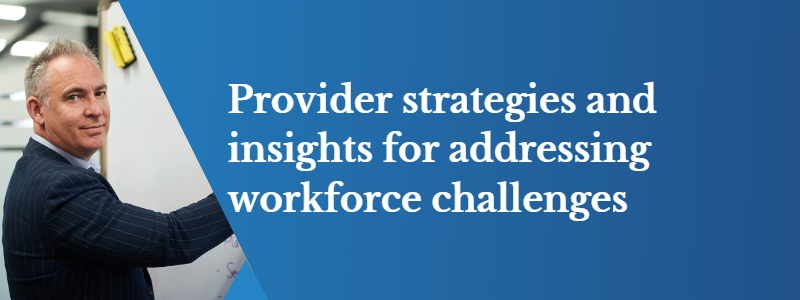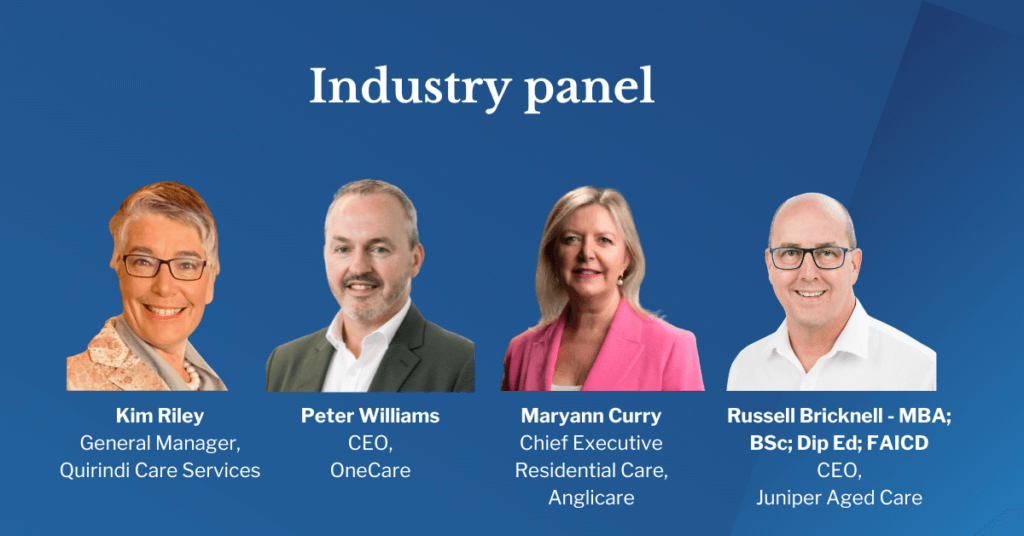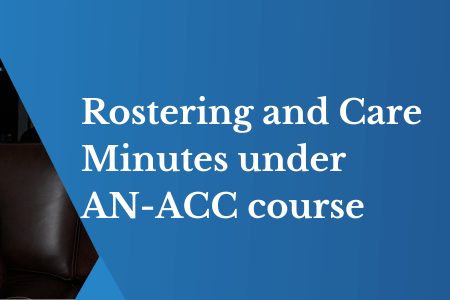How four Aged Care CEOs are navigating their workforce challenges
August 13, 2024 | Data

By Andrew Farmer, CEO and Partner
In our July webinar, we heard from four distinguished panelists: Maryann Curry – Chief Residential Officer of Anglicare, Kim Riley – GM of Quirindi Care Services, Russell Bricknell – CEO Juniper Aged Care, and Peter Williams – CEO of OneCare. Each shared their unique perspectives on the workforce challenges their organisations face and the strategies they’ve employed to overcome them.

CEO insights on their organisation’s workforce challenges
Maryann’s journey with Anglicare
Maryann highlighted the significant workforce challenges Anglicare has encountered, particularly during the COVID-19 pandemic. These included high agency and overtime costs, a highly casualised workforce, and unstable occupancy levels.
To address these issues, Anglicare focused on reversing the trend of casualisation by building stability in rosters and engaging staff in a more permanent capacity. Maryann proudly noted their success, with turnover rates now at 15% and the casual workforce reduced to just over 20%. This stability has not only improved the quality of care but also increased occupancy rates, highlighting the importance of a permanent and engaged workforce.
Russell’s approach in remote communities
Russell shared a similar story of challenges and triumphs but with the added complexity of operating in remote and isolated regions of Western Australia. Attracting staff to these locations is an ongoing challenge. To tackle this, Juniper has invested in employee housing, specialised pay regimes, and utilised migration schemes.
They’ve also focused on improving the employee journey from initial contact through to onboarding and beyond. However, a key challenge remains: maintaining engagement and excitement among staff beyond the 18-month mark. Addressing this is crucial so Juniper are working on the 18 month to three year window in workforce stability and culture.
Kim’s comprehensive strategy
Kim described a two-year journey of transformation focused on enhancing the employee value proposition to improve retention. This included implementing bonuses, above-award pay, and improving recruitment and onboarding processes. They aimed to reduce their reliance on a casual workforce and improve employee presenteeism.
A major initiative was a roster realignment to better meet organisational needs and improve work-life balance for staff. Early feedback has been positive, although challenges remain, particularly in maintaining a stable workforce in a rural area. Quirindi is also actively recruiting overseas to fill gaps in their roster.
Peter’s experience in Tasmania
Peter echoed the sentiments of the other panelists, noting the significant impact of visa regulation changes on their ability to attract staff to regional parts of Tasmania. This has led to an increased reliance on overtime, resulting in fatigue and an uptick in work cover claims.
To combat these issues, OneCare is focusing on staff wellbeing and fostering collaboration among local aged care providers. They’ve also adopted a co-design approach to reshape their service model, allowing staff to work more fluidly across residential care, home care, and independent living. This has improved staff engagement and created a more versatile workforce.
The strategies being used to address workforce challenges
Peter’s innovative approach to staff wellness
Peter discussed their innovative approach to staff wellness, emphasising a pilot program with the University of Tasmania called Mindfulness in Motion. This program, rooted in U.S. practices, allows staff to take an hour out of their day for wellness activities, including meditation and reflective practice. The goal is to reduce burnout and work-related stress. The positive outcomes of the pilot have encouraged the Board to consider expanding the program.
Peter highlighted the importance of proactive leadership in implementing such initiatives rather than waiting for governmental directives. He also touched on the challenge of attracting nurses to aged care, pointing out the financial barriers, especially for international students. Reflecting on his own experience, he suggested that governments could explore ways to make education more affordable to support those passionate about aged care.
Kim’s approach to engagement with staff
Kim emphasised the importance of genuine engagement with staff, moving beyond traditional surveys. Quirindi has been actively engaging with the community to raise the profile of their residential care facilities, showcasing them as great places to work. They are now applying the same model internally to foster a better work environment.
Kim also stressed the significance of clear communication and keeping staff informed about organisational goals. She shared her personal experience of covering shifts as a registered nurse, recognising the need for roster changes to ensure a better work-life balance for staff. Her focus on career progression within the organisation, from personal care workers to registered nurses, is a testament to their commitment to retaining and developing talent.
Russell’s perspective on providing clear career pathways
Russell discussed the importance of providing clear career pathways within Juniper. He shared an inspiring story about individuals with diverse backgrounds, such as cybersecurity experts, joining their workforce and transitioning into care roles. This highlights the potential for non-linear career paths, where staff can explore various opportunities within the organisation, beyond traditional care roles.
By creating a visual representation of these career pathways, Juniper aims to help staff see the tangible possibilities for their professional development. This approach not only engages the workforce but also demonstrates the Juniper’s commitment to their career growth.
Anglicare’s focus on individual’s aspirations
Maryann emphasised the importance of viewing the workforce as individuals with unique needs and aspirations. She highlighted the need for meaningful two-way communication, where staff feel heard and valued. Anglicare has been benchmarking between their 23 facilities but sees potential in more specific internal benchmarking focused on workforce criteria.
She also mentioned leveraging existing resources, such as dieticians and physiotherapists, to develop employee well-being programs. By thinking outside the box and utilising the expertise within their homes, they aim to create a supportive community where staff enjoy coming to work.
Our panelists provided a wealth of insights into addressing workforce challenges in aged care. As we move forward, it’s clear that addressing these challenges requires a multifaceted approach, focusing on the well-being, engagement, and development of staff.
To watch the full webinar recording visit the events page.
If you’d like to explore ideas for your workforce strategy, please get in touch.


